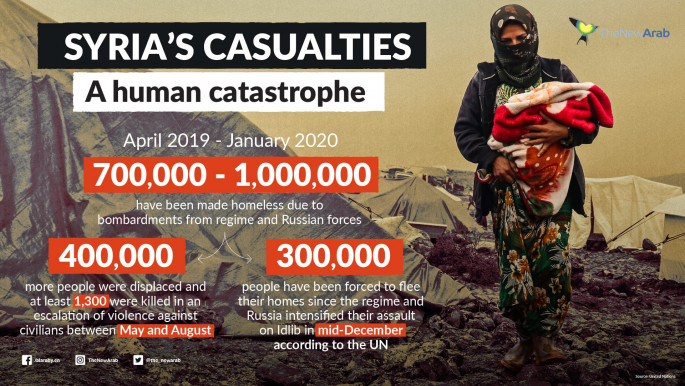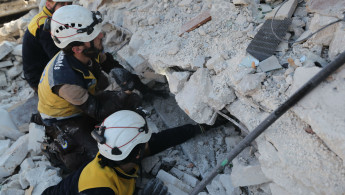Seven family members among scores killed in Syria airstrikes
Moscow-backed government forces have upped their deadly bombardment of the region in recent weeks, chipping at its southern edge and causing tens of thousands to flee their homes.
Eight of those killed Sunday died in a regime barrel bomb attack in the town of Sarmeen, seven from the same family, the Syrian Observatory for Human Rights said.
Rescue workers pulled the bodies of a nine-year-old girl and a 13-year-old boy from the debris of a two-storey building, an AFP correspondent in the town said.
Their father, Abu Fida, stood by weeping.
"It's a terrible disaster," he said.
Abu Fida said he and his family had fled bombardment on Sarmeen on Thursday, with just the clothes on their back.
They returned on Saturday night to collect their belongings, deciding to spend a last night at home before leaving for good.
"I wanted to get my family out this morning but my wife told me to go to work. So I sent them a driver with a car to transport their things," but then aircraft hit the house, he told AFP.
His wife was inside the house when it was struck, but he survived with three other children.
Wounded journalists
In the rest of the emballed bastion Sunday, Russian and regime air strikes killed another six civilians, the Observatory said.
The Britain-based monitor says it relies on sources inside Syria, and determines who carries out air strikes according to flight patterns, as well as the aircraft and ammunition involved.
Nine years into the war, the Damascus regime is back in control of around 70 percent of the country, but the northwestern region of Idlib remains beyond its reach.
Syria's former Al-Qaeda affiliate controls the Idlib region, home to some three million people, but pro-Ankara rebel groups are also present.
In recent months, pro-Damascus forces have pressed northwards along the M5 highway that connects the capital Damascus to second city Aleppo in the north, crossing Idlib.
Last week the government forces retook from rebels the key town of Maaret al-Numan along the highway and are now just several kilometres from the abandoned town of Saraqeb.
Clashes are also raging in the bastion's eastern flank in Aleppo province, where state news agency SANA said four television journalists were wounded Sunday.
Twitter Post
|
The journalists for a pro-Damascus channel and two Arabic-language Iranian outlets were targeted by "terrorists", SANA said, using its blanket term for jihadists and rebels.
A Turkish-Russian deal in 2018 saw Turkish troops deploy at observation posts around Idlib, but the agreement has failed to stem repeated regime military offensives.
On Sunday morning, an AFP correspondent and the Observatory said a Turkish military convoy of hundreds of vehicles entered northern Syria, deploying in Idlib and neighbouring Aleppo province.
'No longer safe'
Increased violence since early December has forced around 388,000 people to escape their homes in northwestern Syria, the United Nations says.
The Observatory says that more than 260 civilians have been killed.
Half of the Idlib region's residents have been displaced throughout the war, with many living in precarious shelters in the countryside along the Turkish border.
Ankara - which already hosts more than three million Syrian refugees on its soil - fears the latest fighting will lead to another mass influx.
On Sunday, hundreds of Syrian men, women and children marched towards the frontier demanding to be allowed through in a symbolic protest, an AFP correspondent said.
Near the Syrian border town of Harem, women lugged bags and men carried small children towards the razor-wired wall blocking the way to Turkey, he said.
"From Idlib to Berlin," read one banner, referring to the German capital many Syrians dream of reaching as they escape the war.
Among the demonstrators, Mohammed said he was looking to a better alternative for his family of nine after fleeing his hometown.
"Our goal is to go and live in a safe country - Turkey or Europe," he told AFP. "Here it's no longer safe."
Syria's civil war has killed more than 380,000 people since it started in 2011 with the brutal repression of anti-government protests.
Follow us on Twitter and Instagram to stay connected





 Follow the Middle East's top stories in English at The New Arab on Google News
Follow the Middle East's top stories in English at The New Arab on Google News
![The UAE is widely suspected of arming the RSF militia [Getty]](/sites/default/files/styles/image_330x185/public/2024-11/GettyImages-472529908.jpg?h=69f2b9d0&itok=Yauw3YTG)
![Netanyahu furiously denounced the ICC [Getty]](/sites/default/files/styles/image_330x185/public/2024-11/GettyImages-2169352575.jpg?h=199d8c1f&itok=-vRiruf5)
![Both Hamas and the Palestinian Authority welcomed the ICC arrest warrants [Getty]](/sites/default/files/styles/image_330x185/public/2024-11/GettyImages-2178351173.jpg?h=199d8c1f&itok=TV858iVg)